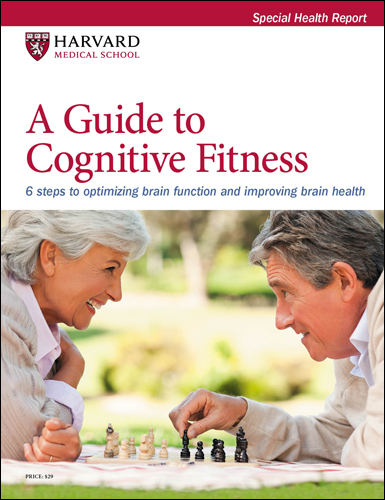Heart attacks may speed cognitive decline
Gleaned from data collected over nearly five decades, the finding underscores the heart-brain connection.
- Reviewed by Christopher P. Cannon, MD, Editor in Chief, Harvard Heart Letter; Editorial Advisory Board Member, Harvard Health Publishing

Just as our bodies become less nimble with age, so do our brains. Being more forgetful or taking longer to recall names or events is a normal part of growing older. But sometimes, these cognitive changes occur faster than usual. Now, new research has found that such accelerated cognitive decline may be more common after a heart attack (see "Cognitive changes after a heart attack").
Cognition — the ability to reason and remember — can be assessed in many different ways. The new study considered global (that is, overall) cognition, which encompasses such areas as learning, processing speed, and executive function (the ability to carry out mental tasks such as planning ahead or remembering instructions). Immediately after a heart attack, survivors experienced no apparent cognitive changes. But they showed a faster, persistent drop in global cognition over the following years compared with people who didn't have heart attacks. The decline was equal to about six to 13 years of normal cognitive aging, according to the study authors.
Cognitive changes after a heart attackTo better understand the causes of cognitive problems — and potential prevention strategies — researchers looked at data from six large studies done in the United States over the past five decades. Their findings, in the July 2023 issue of JAMA Neurology, are summarized below. Who: 30,465 adults with no history of heart attack, stroke, or dementia. Just over half (56%) were women; 29% were Black, and 8% were Hispanic. When: The studies ran from 1971 to 2019. What: During follow-up periods that ranged from about five to 20 years,1,033 people had a heart attack. (Among that group, 137 had two heart attacks.) All participants had at least one cognitive assessment, and those who had a heart attack had at least one assessment both before and after the event. Key findings: Cognitive changes were not apparent immediately after a heart attack. But in the following years, heart attack survivors experienced a faster-than-normal decline in cognitive ability. |
Heart-brain links
What might explain these findings? Heart attacks may lead to changes that directly affect blood flow to the brain or that trigger atrial fibrillation, a heart rhythm disorder known to increase the risk of major strokes. Such strokes, in turn, can cause severe cognitive problems that interfere with function (dementia). People who experience heart attacks also have higher rates of depression, another condition tied to dementia.
However, the same factors that lead to narrowed heart arteries — the root cause of most heart attacks — can also lead to cerebral small vessel disease. Also known as microvascular ischemic disease, this condition results from high cholesterol and the relentless pounding of high blood pressure inside the brain's small arteries. Over time, the linings of these vessels thicken, choking off blood flow and causing tiny "silent" strokes.
"A single microscopic stroke isn't visible on a brain scan. But if dozens or hundreds accumulate, they show up as bright areas on an MRI scan," says Dr. Andrew Budson, chief of Cognitive and Behavioral Neurology at the VA Boston Healthcare System and a lecturer in neurology at Harvard Medical School. The bright spots are known as white matter lesions (white matter consists of bundles of nerve fibers that connect brain cells).
In recent decades, doctors have come to realize that cerebral small vessel disease is to blame for the vast majority of cases of vascular dementia — that is, the type of dementia caused by blood vessel problems, as opposed to Alzheimer's disease. Previously, vascular dementia was thought to result mainly from strokes in large vessels, most of which occur when a clot blocks a brain artery, Dr. Budson explains.
Brain aging: Normal vs. fast
In fact, most older people's brain scans show some evidence of white matter lesions; they're recognized as markers of the typical cognitive changes that occur with age. But people who have heart attacks likely have more (and perhaps some as yet unrecognized) risk factors for tiny strokes. As a result, they likely have more white matter lesions and experience even greater cognitive decline. "As a neurologist who looks at brain scans all the time, I believe this is the most likely explanation," says Dr. Budson.
For preventing heart attacks, the evidence for following a healthy diet, getting regular exercise, and maintaining a normal weight is already very strong. Consider the extra protection for your brain health as an added bonus.
Image: © mgstudyo/Getty Images
About the Author

Julie Corliss, Executive Editor, Harvard Heart Letter
About the Reviewer

Christopher P. Cannon, MD, Editor in Chief, Harvard Heart Letter; Editorial Advisory Board Member, Harvard Health Publishing
Disclaimer:
As a service to our readers, Harvard Health Publishing provides access to our library of archived content. Please note the date of last review or update on all articles.
No content on this site, regardless of date, should ever be used as a substitute for direct medical advice from your doctor or other qualified clinician.
















